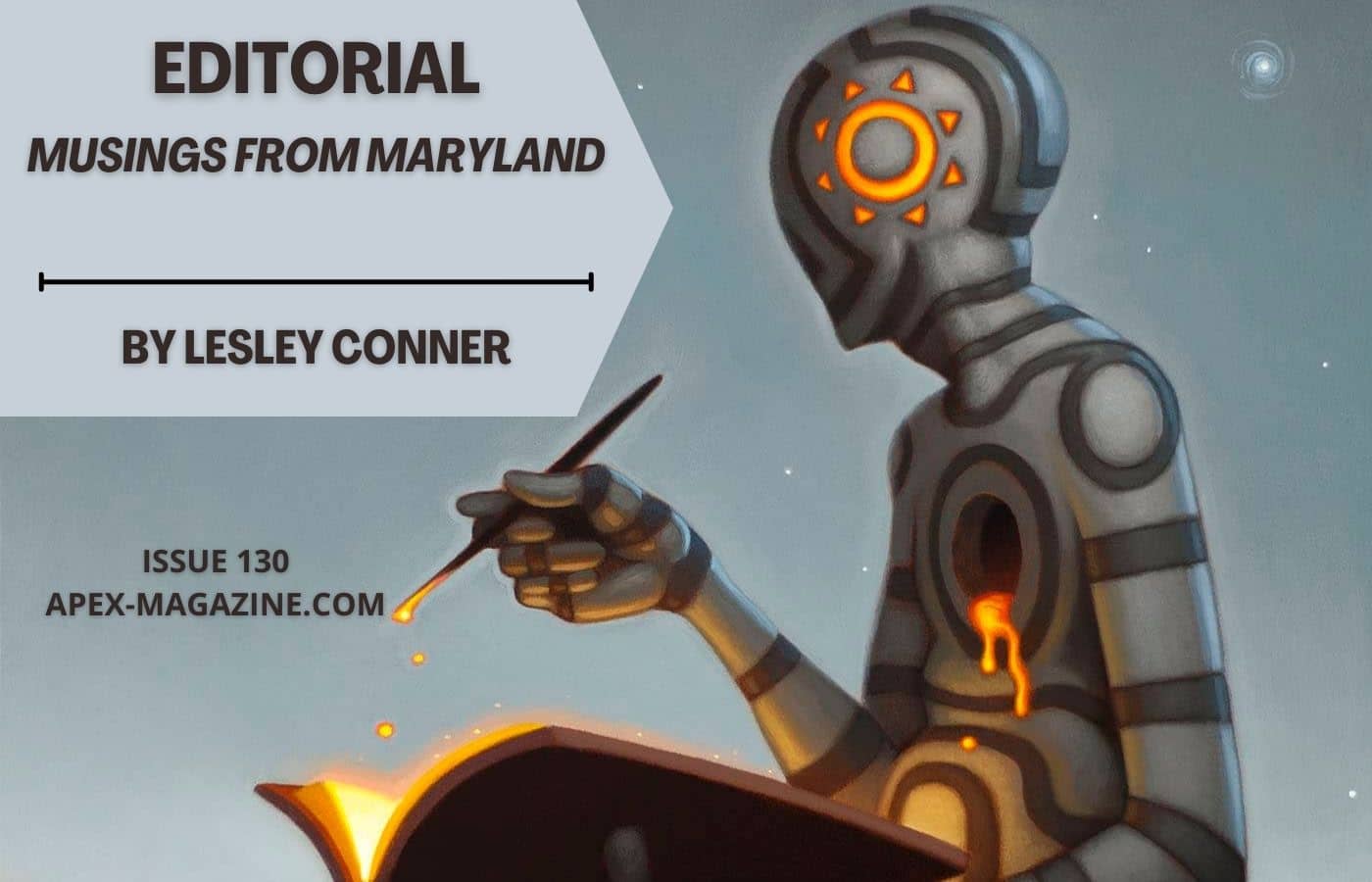
Welcome to Issue 130.
Time is a fickle thing. That became abundantly clear at the beginning of the pandemic, when months—and then years—passed, and yet somehow it still feels like March 2020. But December 2019? That was eons ago.
This month we explore time, self-discovery, and the weight of others’ judgments with our original short fiction selections. We bring you a fairy tale, alternate realities, AI family drama, a Native cautionary tale, and more! Three of the six original fiction pieces are the authors’ first pro magazine sales, which makes me, as an editor, incredibly proud. These stories are top notch, and to be able to be their first pro sale is a wonderful feeling. I have no doubt all three authors will be appearing in many more pro-magazines in the months and years to come.
We open this issue with “Nine Theories of Time” by Spencer Nitkey. This story uses an unusual format—explaining nine theories of time—to deliver a story about grief, time, and parenthood. It is not an easy read, but it is so worth it.
Russel Nichols returns to Apex with a powerful story about two brothers who develop a VR world where white people can experience the horrors of slavery. “To Live and Die in Dixieland” pulls no punches, exploring race, a company’s responsibility when the product they’re offering causes harm, and the media’s role in breaking a story. Nichols consistently brings us stories that pull the reader in and hold a mirror to our society.
“The First Promise We Break” by Risa Wolf is a fairy tale twisted with mythology and dunked in a love story. It’s about the youngest daughter of a king and queen who is so beautiful that the townspeople will pay just to see her or for a strand of her hair. She feels violated in every way. Eventually, she is sent to be the companion of a mysterious man. This story is magical.
Devon Mihesuah’s “Tenure” blends cultural appropriation with Native mythology through the story of a white man faking a Native descendance to further his career. Spanning many years, this story takes us from Chad’s decision to fake his heritage to the rise in his career and the final toll these actions take on him.
I am amazed that “It Rises and Falls and Rises Again” is RJ Taylor’s first fiction publication! This story is amazing. Layered with metaphor and symbolism, we watch as the main character goes on both a physical and emotional journey, exploring interpersonal relationships and self-discovery along the way.
Our final piece of original short fiction this month is “Strata” by Benjamin Blattberg. Man, I love this story! It deals with AI and parental pressure to be someone you’re not. I don’t want to give too much away, but this story really excites me. It’s fresh and deftly deals with a topic that’s so hard for many people.
Our classic fiction this month is “An Arc of Electric Skin” by Wole Talabi and “In the Garden of Ibn Ghazi” by Molly Tanzer. We have essays by Milton J. Davis and Linda D. Addison. Andrea Johnson interviews RJ Taylor and Spenser Nitkey about their stories and writing processes. We have a new Words for Thought by AC Wise, and Keturah Barchers and Lesley Conner review a few novels for us this month.
After years of being our artist interviewer, Russell Dickerson has decided to step down for personal reasons. We are sad to see him go and so thankful for all of the insights he has brought to us through his interviews with our amazing cover artists. Bradley Powers is stepping up to take his place. Bradley is currently studying fine art with a focus on ceramics at Salisbury University. In a way, Bradley has been part of the Apex family for a long time, because she’s my daughter. We were talking about needing to find a new artist interviewer, and Bradley said she’d be interested in giving it a try. Jason and I decided to give her a shot, and, from the strength of her first interview, I feel like she’s a wonderful fit. I hope that you will read her interview with JR Slattum and let us know how she did.
As I’m writing this, we’re watching the Russian invasion of Ukraine unfold. I don’t know what the next few days, weeks, or months hold for the people of Ukraine and for the world. I do know that I am horrified and angry.
When things like this are happening, when so many people are terrified and fighting for their lives, it’s easy to feel like what we do as creatives doesn’t matter. We aren’t saving anyone. We aren’t making a difference. It’s easy to feel unmoored, floating in an anxious sea of “how can I help?” and to feel repulsed by the idea of celebrating a new issue. Then I remember that being an editor at Apex has broadened my world beyond belief. I have friends across the globe—including in Ukraine. I have read stories and gained a deeper understanding and empathy for people who are not like me. That is what creatives bring to the world. We build empathy. We give readers an escape from reality. We find friendships that span the globe. So, if you’re a writer who is wondering why you should keep writing, this is why. If you’re a reader feeling like you don’t deserve the joy stories bring you, you deserve a break. Keep creating and keep reading. We’re all better because of it.
If you’re in Ukraine, please stay safe.










